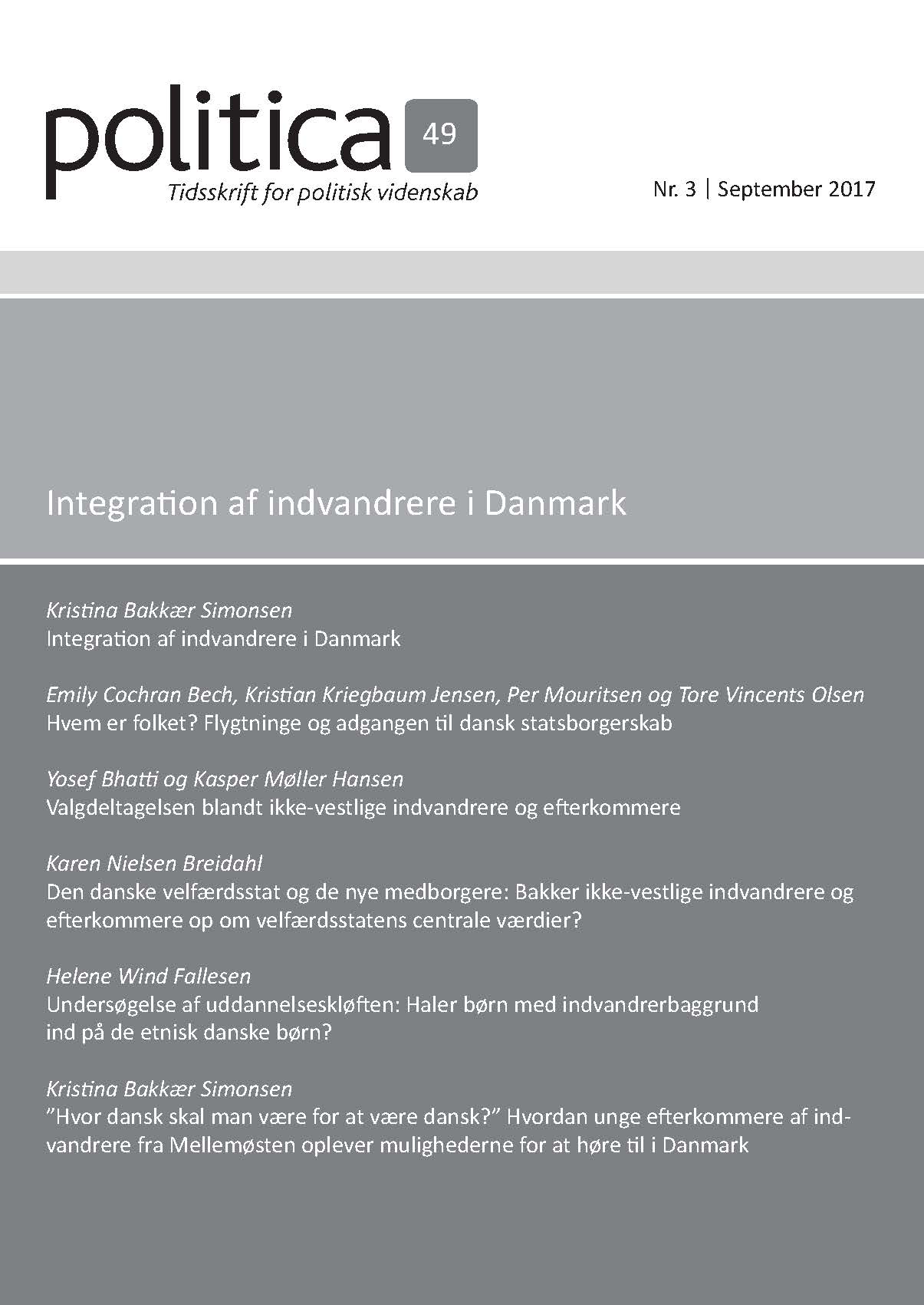”Hvor dansk skal man være for at være dansk?” Hvordan unge efterkommere af indvandrere fra Mellemøsten oplever mulighederne for at høre til i Danmark
DOI:
https://doi.org/10.7146/politica.v49i3.131254Abstract
Forskningen i integration af indvandrere og deres børn interesserer sig typisk for funktionelle og objektive mål, mens der mere sjældent sættes fokus på den identifikationsmæssige integration. På baggrund af dybdegående interviews undersøger jeg, hvordan unge efterkommere af indvandrere fra Mellemøsten opfatter grænsen til det danske, og hvilke konsekvenser dette har for deres følelse af nationalt tilhør. Analysen viser, at der er udbredt konsensus blandt interviewpersonerne om, hvilke markører der ekskluderer en fra det danske. Variationen i graden af nationalt tilhør blandt interviewpersonerne (fra sikker identifikation til dis-identifikation) forklares af, hvordan de opfatter deres egen placering i forhold til grænsen.
References
Alba, Richard (2005). Bright vs. blurred boundaries: second-generation assimilation and exclusion in France, Germany, and the United States. Ethnic and Racial Studies 28 (1): 20-49.
Antonsich, Marco (2010). Searching for belonging: An analytical framework. Geography Compass 4 (6): 644-659.
Billig, Michael (1995). Banal Nationalism. London: Sage.
Bochove, Marianne von, Jack Burgers, Amber Geurts, Willem de Koster og Jeroen van der Waal (2015). Questioning ethnic identity: Interviewer effects in research about immigrants’ self-definition and feelings of belonging. Journal of Cross-Cultural Psychology 46 (5): 652-666.
Bonikowski, Bart og Paul DiMaggio (2016). Varieties of American popular nationalism. American Sociological Review 81 (5): 949-980.
Christensen, Ann-Dorte og Sune Qvotrup Jensen (2012). Stemmer fra en bydel. Aalborg: Aalborg Universitetsforlag.
Gaertner, Samuel L. og John F. Dovidio (2000). Reducing Intergroup Bias: The Common Ingroup Identity Model. East Sussex: Psychology Press.
Hage, Ghassan (1998). White Nation: Fantasies of white supremacy in a multi-cultural society. Annadale: Pluto Press.
Jenkins, Richard (2014). Social Identity. Oxon: Routledge.
Jensen, Kristian, Johanne Helboe Nielsen, Morten Brænder, Per Mouritsen og Tore Vincents Olsen (2010). Tolerance and Cultural Diversity Discourses in Denmark. Firenze: European University Institute.
Kannabiran, Kalpana, Ulrike M. Vieten og Nira Yuval-Davis (2006). Introduction to the special issue, ”Boundaries, identities and borders: Exploring the cultural production of belonging”. Patterns of Prejudice 40 (3): 189-195.
Lamont, Michéle (1992). Money, Morals, and Manners: The Culture of the French and American Upper-Middle Class. Chicago: The University of Chicago Press.
Lähdesmäki, Tuuli, Tuija Saresma, Kaisa Hiltunen, Saara Jäntti, Nina Sääskilahti, Antti Vallius og Kaisa Ahvenjärvi (2016). Fluidity and flexibility of “belonging”: Uses of the concept in contemporary research. Acta Sociologica 56 (3): 233-247.
Mouritsen, Per og Tore Vincents Olsen (2013). Denmark between liberalism and nationalism. Ethnic and Racial Studies 36 (4): 691-710.
Mythen, Gabe, Sandra Walklate og Fatima Khan (2012). ”Why should we have to prove we’re alright?”: Counter-terrorism, risk and partial securities. Sociology 47 (2): 383-398.
Sabiers, Sune Enevoldsen og Mikkel Harboe (2014). De sociale klasser i Danmark 2012. København: Arbejderbevægelsens Erhvervsråd.
Skey, Michael (2013). Why do nations matter? The struggle for belonging and security in an uncertain world. The British Journal of Sociology 64 (1): 81-98.
Statham, Paul og Jean Tillie (2016). Muslims in their European societies of settlement: A comparative agenda for empirical research on socio-cultural integration across countries and groups. Journal of Ethnic and Migration Studies 42 (2): 177-196.
Wang, Jennifer, Camden Minervino og Sapna Cheryan (2012). Generational differences in vulnerability to identity denial: The role of group identification. Group Processes & Intergroup Relations 16 (5): 600-617.
Wright, Matthew (2011). Policy regimes and normative conceptions of nationalism in mass public opinion. Comparative Political Studies 44 (5): 598-624.
Zolberg, Aristide R. og Long Litt Woon (1999). Why Islam is like Spanish: Cultural incorporation in Europe and the United States. Politics & Society 27 (1): 5-38.





